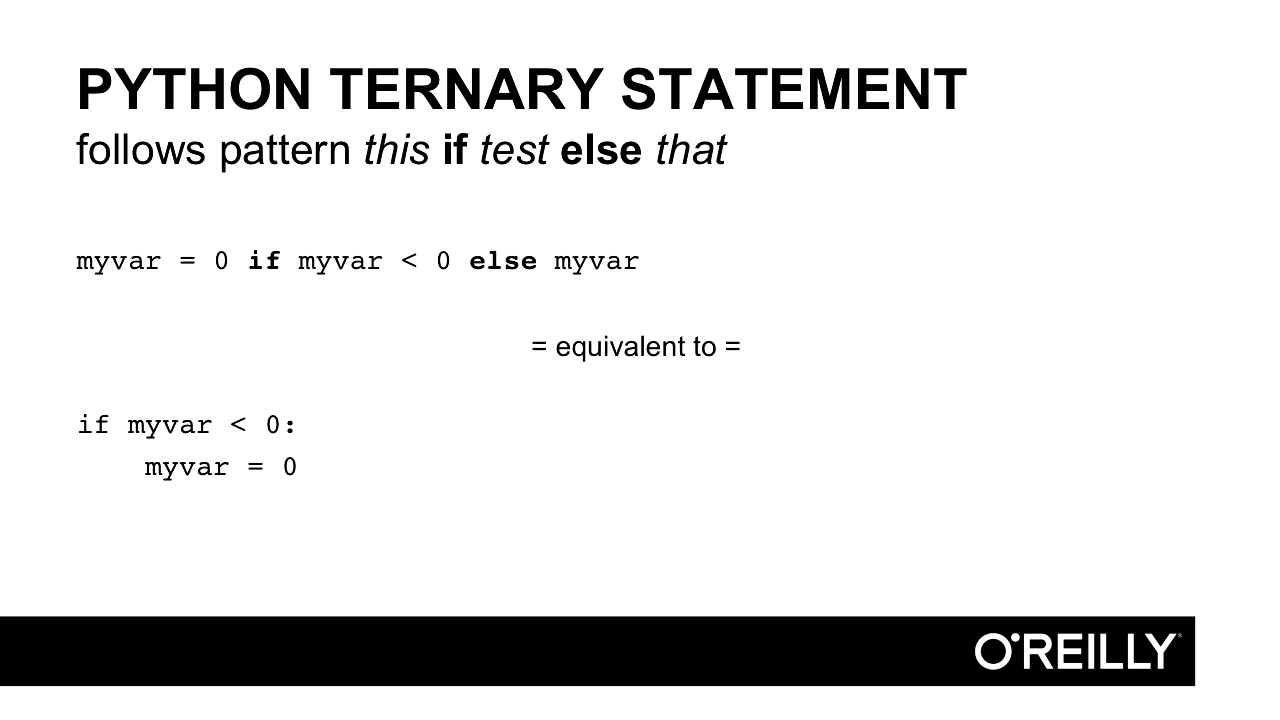Python Ternary Operator Explained: One-Line Conditionals
Learn how Python implements ternary conditional operators for concise one-line conditional expressions.
Learn how Python implements ternary conditional operators for concise one-line conditional expressions.
In Python, you can use a streamlined approach to handle conditional assignments using the ternary operator. This operator offers a compact way to express logic that would typically require a multi-line if-else statement. Instead of the traditional question mark ("?") found in other languages, Python adopts a more readable structure that resembles a natural language sentence.
Python's ternary operator provides a concise way to express conditional assignments. Unlike traditional ternary operators using "?", Python employs a structure resembling an English sentence for readability.
The syntax is as follows:
value_if_true if condition else value_if_false
Let's break it down:
condition: This part holds an expression that evaluates to either True or False.
value_if_true: If the condition is True, the expression in this part is executed, and its result becomes the outcome of the entire ternary operation.
else: This keyword separates the true and false branches.
value_if_false: If the condition is False, the expression following else is executed, and its result becomes the outcome of the ternary operation.
Example:
Let's say you want to determine if a number is even or odd and store the result in a variable:
num = 10
result = "Even" if num % 2 == 0 else "Odd"
print(result) # Output: EvenIn this example:
num % 2 == 0 is the condition. Since 10 is divisible by 2, it evaluates to True."Even" is the value_if_true."Odd" is the value_if_false.Since the condition is True, the ternary operator returns "Even", which is then assigned to the variable result.
Advantages of using the ternary operator:
Limitations:
if-else block might be more readable.if-else statements.Overall, the ternary operator in Python is a valuable tool for writing concise and expressive code when used appropriately.
This Python code takes an integer input from the user, determines if it's even or odd using the ternary operator and modulo operation, and then prints the result indicating whether the input number is even or odd.
# Get user input for a number
num = int(input("Enter a number: "))
# Use the ternary operator to determine if the number is even or odd
result = "Even" if num % 2 == 0 else "Odd"
# Print the result
print(f"The number {num} is {result}")Explanation:
num variable.num % 2 == 0 checks if the number is divisible by 2.True (even), the expression assigns "Even" to the result variable.False (odd), it assigns "Odd" to result.Example Usage:
Input: 10
Output: The number 10 is Even
Input: 7
Output: The number 7 is Odd
This example demonstrates the concise nature of the ternary operator, allowing you to perform a conditional assignment and determine the even/odd nature of a number within a single line of code.
Think of it like an inline if-else: The ternary operator acts as a shorthand for a simple if-else statement, condensing the logic into a single line.
Avoid overusing it: While concise, using the ternary operator for complex conditions can harm readability. Stick to simple scenarios for clarity.
Parentheses for clarity: Although not always required, parentheses can improve readability, especially for longer expressions within the ternary operator.
Alternatives for multiple conditions: If you have more than two possible outcomes, using a standard if-elif-else block is generally more appropriate.
Python version compatibility: The ternary operator was introduced in Python 2.5. If you're working with older versions, you'll need to use traditional if-else statements.
Debugging tip: If you encounter issues, try breaking down the ternary operator into a regular if-else statement to pinpoint the problem more easily.
| Feature | Description |
|---|---|
| Purpose | Provides a concise way to express conditional assignments. |
| Syntax | value_if_true if condition else value_if_false |
| How it works | - Evaluates the condition.- If True, returns value_if_true.- If False, returns value_if_false. |
| Advantages | - Conciseness: Writes compact code. - Readability: Mimics natural language. |
| Limitations | - Complexity: Not ideal for intricate conditions. - Debugging: Can be trickier than traditional if-else. |
| Best Use | Simple conditional assignments where readability is desired. |
In conclusion, Python's ternary operator offers a powerful way to condense conditional assignments into a single, readable line of code. By adhering to its straightforward syntax, value_if_true if condition else value_if_false, you can enhance code conciseness without sacrificing clarity. While particularly well-suited for simple conditional assignments, remember that readability should always be a priority. Avoid using the ternary operator for overly complex logic, as this can hinder code comprehension. When used judiciously, the ternary operator becomes a valuable asset in a Python developer's toolkit, promoting both efficient and expressive coding practices.
 Does Python Have a Ternary Conditional Operator? | LearnPython ... | Wondering if Python has a ternary conditional operator? We will tell you everything about Python ternary assignment in this article!
Does Python Have a Ternary Conditional Operator? | LearnPython ... | Wondering if Python has a ternary conditional operator? We will tell you everything about Python ternary assignment in this article! Python Ternary: How to Use It and Why It's Useful (with Examples) | In this tutorial, we'll discuss the Python ternary operator, its syntax, its advantages and limitations, and how to use it.
Python Ternary: How to Use It and Why It's Useful (with Examples) | In this tutorial, we'll discuss the Python ternary operator, its syntax, its advantages and limitations, and how to use it. Does Python Have a Ternary Conditional Operator? | Sentry | The Problem You know that some programming languages make use of a ternary operator to shorten if-else code blocks, but does Python support this kind of syntax…
Does Python Have a Ternary Conditional Operator? | Sentry | The Problem You know that some programming languages make use of a ternary operator to shorten if-else code blocks, but does Python support this kind of syntax… Python Ternary Operator | Usage Guide with Examples | Struggling with Python's ternary operator? Like a traffic light, the ternary operator can help control the flow of your code.
Python Ternary Operator | Usage Guide with Examples | Struggling with Python's ternary operator? Like a traffic light, the ternary operator can help control the flow of your code. Ternary Operator in Python - GeeksforGeeks | A Computer Science portal for geeks. It contains well written, well thought and well explained computer science and programming articles, quizzes and practice/competitive programming/company interview Questions.
Ternary Operator in Python - GeeksforGeeks | A Computer Science portal for geeks. It contains well written, well thought and well explained computer science and programming articles, quizzes and practice/competitive programming/company interview Questions. Python's ternary operator - Python Morsels | Nov 14, 2022 ... Python doesn't have the traditional ternary operator that most programming languages do. Instead we have "conditional expressions".
Python's ternary operator - Python Morsels | Nov 14, 2022 ... Python doesn't have the traditional ternary operator that most programming languages do. Instead we have "conditional expressions". Does Python have a ternary conditional operator? – O'Reilly | Learn how to use Python’s ternary operator to create powerful “one-liners” and enhance logical constructions of your arguments.
Does Python have a ternary conditional operator? – O'Reilly | Learn how to use Python’s ternary operator to create powerful “one-liners” and enhance logical constructions of your arguments. Using the question mark (?) for inline conditions - Python Help ... | In JavaScript, you can code some conditional assignment by using “?” var weather = temperature > 30 ? “Hot” : “cold” It means that weather will be set to ‘hot’ if temperature > 30 is true, and to ‘cold’ if temperature > 30 is false. You can find more here. I think it’s a good idea to implement this feature in python, because it can help developers to code faster and have a lighter code. The implementation may be (in my opinion) something like this (exactly the same as JavaScript) : some...
Using the question mark (?) for inline conditions - Python Help ... | In JavaScript, you can code some conditional assignment by using “?” var weather = temperature > 30 ? “Hot” : “cold” It means that weather will be set to ‘hot’ if temperature > 30 is true, and to ‘cold’ if temperature > 30 is false. You can find more here. I think it’s a good idea to implement this feature in python, because it can help developers to code faster and have a lighter code. The implementation may be (in my opinion) something like this (exactly the same as JavaScript) : some...